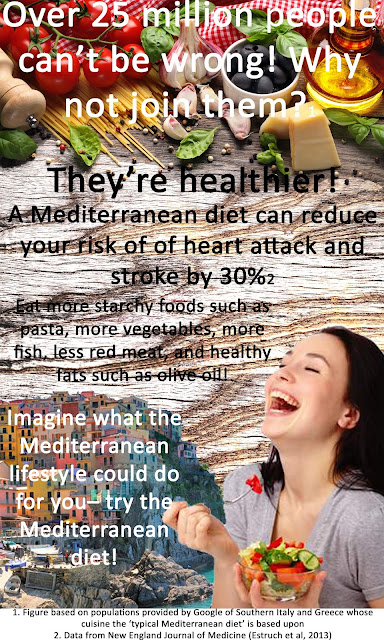The above poster advertises the Mediterranean diet choice, based primarily on the cuisines of Southern Italy and Greece.
The opening statement (“25 million people can’t be wrong”) takes advantage of the principle of social proof; the idea that people are more likely to conform to a particular behaviour if they see that others are doing the same (e.g. Reingen, 1982). By highlighting the number of others adopting the diet choice the advert plays on the assumption that if many people are doing something, it must be the right course of action for a certain outcomes (i.e. the right diet for optimum health).
The advert also uses a rhetorical question (“Why don’t you
join them?”) which has been shown to increase the attention an individual pays
to a persuasive message, and also increase how intensively they process it, in
turn increasing its persuasiveness. (Burnkrant & Howard, 1984). By questioning why the audience hasn't yet considered this diet choice, the poster forces them to consider the message more intently, and in turn their own response to the information presented.
By trying to sell the Mediterranean lifestyle as well as the
diet itself, the advert aims to make a positive association between the sun,
sand, and sea one associates with the Mediterranean with the healthier
lifestyle choice of a Mediterranean diet.
Research has shown that associating something neutral with something
positive (e.g. a neutral person with receiving a reward; Lott & Lott, 1960)
makes an individual associate the positive aspects of that with the neutral
thing or message. Thus, the advert associates the positive aspects of the sun
and beaches lifestyle of the Mediterranean with the healthy eating option of a Mediterranean
diet. Moreover, the imagery of the beautiful coastal properties of Southern Italy helps to further cement this positive association. This is further aided by asking the reader to "imagine" what this lifestyle and diet could do for them personally. Imagery sells, and it has been shown that asking someone to imagine themselves performing a certain desired behaviour increases the likelihood that they will actually perform that advocated behaviour (Gregory, Cialdini & Carpenter, 1982).
Moreover, the inclusion of a lady smiling modelling the
desired behaviour can aid the persuasiveness of a message by inducing a
positive mood. It has been shown that inducing a positive mood in the recipient
of the persuasive message, can increase its effectiveness as a positive mood
directly influences the positivity of the attitude (Petty, Schumann, Richman
& Strathman, 1993). Moreover, in an experiment by Gunnery and Hall (2014) it was shown that people smiling a Duchenne smile (assumed to be the most genuine expression of positive affect) were more persuasive at convincing naive observers of the quality of a juice drink. The advert therefore aims to present a convincing image of someone genuinely enjoying the diet choice it's promoting, in order to increase the level of persuasion.
References
Burnkrant, R. E., & Howard, D. J. (1984). Effects of the
use of introductory rhetorical questions versus statements on information
processing. Journal of Personality and Social Psychology, 47(6),
1218.
Gregory, W. L., Cialdini, R. B., & Carpenter, K. M. (1982). Self-relevant scenarios as mediators of likelihood estimates and compliance: Does imagining make it so? Journal of Personality and Social Psychology, 43, 89-99
Gunnery, S. D., & Hall, J. A. (2014). The Duchenne smile and persuasion. Journal of Nonverbal Behavior, 38(2), 181-194
Gregory, W. L., Cialdini, R. B., & Carpenter, K. M. (1982). Self-relevant scenarios as mediators of likelihood estimates and compliance: Does imagining make it so? Journal of Personality and Social Psychology, 43, 89-99
Gunnery, S. D., & Hall, J. A. (2014). The Duchenne smile and persuasion. Journal of Nonverbal Behavior, 38(2), 181-194
Lott, B. E., & Lott, A. J. (1960). The formation of
positive attitudes toward group members. The Journal of Abnormal and
Social Psychology, 61(2), 297.
Petty, R. E., Schumann, D. W., Richman, S. A., &
Strathman, A. J. (1993). Positive mood and persuasion: Different roles for
affect under high-and low-elaboration conditions. Journal of
personality and social psychology, 64(1), 5.
Reingen, P. H. (1982). Test of a list procedure for inducing
compliance with a request to donate money. Journal of Applied
Psychology, 67(1), 110.


No comments:
Post a Comment
Note: Only a member of this blog may post a comment.